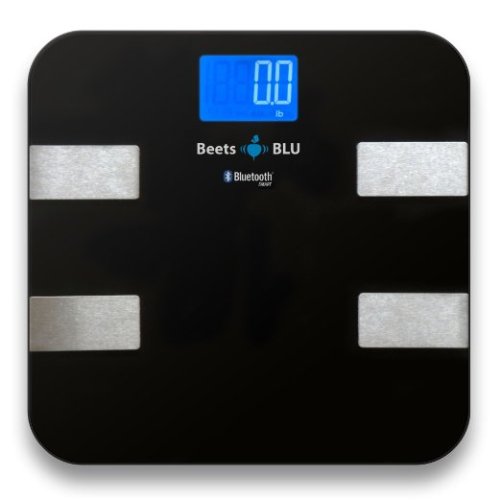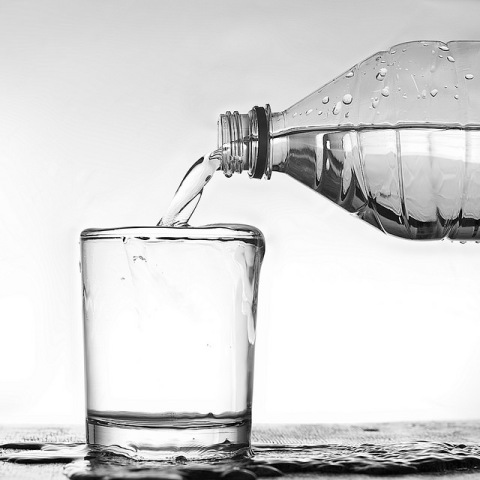Disclosure: I received a free sample of the Beets Blu Bluetooth Scale mentioned in this post. I was not additionally compensated for my time. All opinions expressed are my own.
It’s August and it’s hot almost everywhere in the country. (Way to state the obvious, right?) I’m the type of person who likes to stay active all year round with outdoor activities like biking, running and hiking. However, getting outdoors and exercising in the heat requires taking many precautions—the main one is being properly hydrating. This post will teach you about the dangers of dehydration, why and how a scale should be your best friend for staying properly hydrated and how to calculate your sweat rate.
I was recently fortunate enough to receive a Beets Blu Bluetooth Scale. This sleek looking scale not only measures your body weight, but it measures your percentage of body fat, muscle and BMI. It conveniently syncs to your phone via Bluetooth so that you can track your progress over time. It’s a really cool gadget to have around to track your weight and muscle mass, but I’ve found that it can also help me track my hydration level when exercising in the heat. Before I explain how, let me give you the low-down on dehydration.

Obviously, as you sweat during exercise, you lose water and electrolytes. Electrolytes is just a fancy term for salt and other minerals inside your body that are vital to cell function. Without the proper amount of water and electrolytes inside your body, dehydration will occur causing early fatigue, lack of coordination, slower reaction times and decreased athletic performance. Although we all know dehydration is not ideal, it’s often difficult to determine whether you are properly hydrated. Unfortunately, the body’s thirst sensors are not all that accurate, so the body is not always prompted to drink adequate amounts of fluid. So, how can you know if you are properly hydrated when exercising in the heat?
Use a scale! Losing fluids during exercise will cause weight loss. Although this may sound beneficial to anyone trying to lose weight, water weight is not the kind of weight that you want to lose. Fluid losses lead to a crappy feeling and will almost always be gained back over time with normal drinking and eating. To determine if you are losing water weight and becoming dehydrated during exercise, follow these simple steps:
- Weigh yourself before exercising.
- While exercising, take note of how much you drink. If you use a water bottle, measure how much fluid you put into the water bottle. If you sip from a water fountain, try to guesstimate how many sips of water you take. Assume a large sip is about ½ cup or 4 ounces of water.
- After completing your exercise, weigh yourself again. Make sure that you wear exactly what you were wearing during your first visit to the scale (i.e. shoes on or off).
- Determine how much you drank. If you used a water bottle, measure out how much water is left. Subtract that from the initial amount to find out how much you drank.
- If you lost less than 1 pound, you did a good job of properly hydrating! If you lost more than 1 pound, determine your sweat rate:
Sweat rate (per the amount of time exercised) = how much you lost (in ounces) + how much you drank (in ounces)
*1 pound = 16 ounces
For example, if you exercised for 1 hour and lost 1 pound (16 ounces) and you drank 16 ounces, your sweat rate would be:
16 + 16 = 32 ounces
That means you sweated out 32 ounces during 1 hour. You now know that you will sweat out about 32 ounces in one hour of exercise in similar heat conditions. This will allow you to properly combat dehydration by consuming 32 ounces of fluid in 1 hour (or 8 ounces every 15 minutes).
Although this may seem like a complicated procedure, it’s really beneficial to perform this sweat test once to know how to keep yourself properly hydrated during exercise in the summer. It will make a world of difference in your athletic performance and how you feel! Try it and let me know how it goes!


Thank you for this! Two years ago my son, William (6 at the time), spent his summer at the YMCA daytime camp. Obviously, the daily activities included A LOT of running. All this in the Florida heat! One month into the program William had to be rushed to All Children’s Hospital (by ambulance), because he was having a seizure. After scans and tests it was discovered that he was dehydrated. This blog brings much light to that day.
LikeLike
Aww Donna, I had no idea that happened to William. Yes, dehydration is so serious and most people are totally unaware of how dangerous it can be. I’m glad that this post helps you understand how to stay properly hydrated, especially in Florida!
LikeLike
This is a great reminder for people weighing themselves right after they workout to remember to drink plenty of water! Thanks for breaking down how to calculate sweat rate.
LikeLike
That is true and definitely something to add to this! Weight loss immediately following a work out may not be true weight loss! Thanks for commenting
LikeLike
That scale looks super cool!
LikeLiked by 1 person